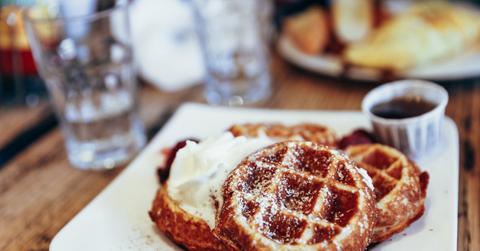This 'Rubbish Cafe' Lets Customers Pay With Plastic Trash
Ecover, a company that manufactures eco-friendly cleaning products, is launching a temporary "'Rubbish Cafe" that offers vegetarian meals and drinks for people that donate recyclable plastic. The two-day event promotes the company's ambitions to remove single-use plastic.
Updated May 20 2019, 4:20 p.m. ET
Belgian-based Ecover is officially setting up The Rubbish Cafe, a temporary shop that lets customers "pay" for food and drinks with recyclable plastic waste. The unique shop is open for two days, May 3rd and 4th, at the Covent Garden in London.
The pop-up cafe features an upcycled interior created by designer Max McMurdo and a zero-waste, vegetarian menu created by sustainable chef Tom Hunt. As you’d expect, most of the food items will be vegan-friendly, including banana bread with fruit, grain bowls with kale, and a vegan wild rice bowl.
Ecover will be using more recycled plastic for their products over the next three years. Last October, the company launched a detergent bottle that was made from 50 percent of plastic pollution collected from the oceans. They’ve also made a push to eliminate the use of single-use plastic.
“As manufacturers we believe we need to totally re-think plastic,” the company said on their Ocean Plastic campaign page. “How we make it, use it, re-use it and recycle it. Industry as a whole should take more responsibility, because using a durable material like plastic for a single use is systemically wrong.”
The Rubbish Cafe is another effort to raise awareness in the negatives of single-use plastic. Those that have recyclable bottles, soup containers, and bags are able to trade those items in for healthy food and drinks. It’s been heavily advertised locally with coverage on TV, radio, websites, and social media -- you can show your support with #LetsLiveClean.
Ecover has some other sustainable projects up their sleeve. They’ll be launching a new washing-up liquid bottle that’s made from 100 percent recycled plastic and will add some of that material to their bottle caps. By 2020, their aiming for all of their bottles to be fully made from recycled products and are testing out high-density polyethylene plastic.
Also by 2020, they plan on testing biodegradable packaging that won’t harm the environment even if it does end up in the trash. Some examples include using potato-based plastic or fiber-based wood pulp. It’s going to be impossible for everything to be recycled, and this would be the next-best step to reduce waste.
